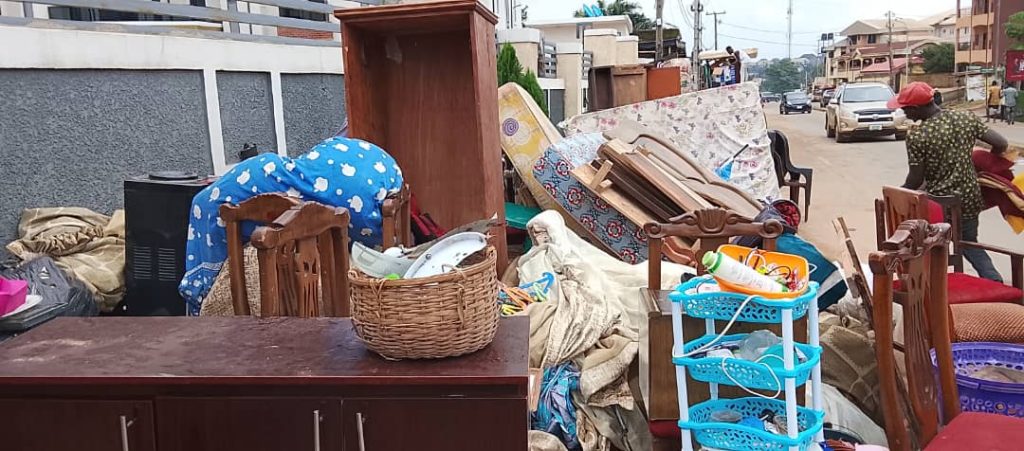The forceful eviction of tenants and shop owners from a commercial property along Secretariat Road in Awka, Anambra State, has sparked outrage and accusations against the Catholic Diocese of Awka. The affected individuals, who were caught off guard by the sudden eviction, claim they were given no prior notice and that their properties, worth millions of Naira, were destroyed in the process, much of it during a heavy downpour. The eviction, executed by court bailiffs accompanied by security operatives, stemmed from a court order granting ownership of the property to the Catholic Diocese of Awka. The tenants, however, maintain they were unaware of any underlying ownership dispute between the church and their previous landlord until the forced eviction.
The tenants’ primary grievance centers on the lack of notice, which they believe deprived them of the opportunity to safely remove their belongings and mitigate their losses. Osita Obi, a human rights activist and one of the evicted tenants, emphasized that while they respect the court’s decision regarding ownership, the lack of communication and the destructive manner of the eviction are unacceptable. He detailed how his wife’s shop, along with those of other tenants, was broken into without warning, leading to substantial financial losses. Obi personally estimated his losses at over N5 million, while other tenants who had recently paid rent, renovated their shops, and stocked perishable goods faced losses exceeding N9 million collectively. This sudden upheaval has left the tenants struggling to comprehend their next steps and demanding justice for their losses.
Adding to the tenants’ distress is the alleged disregard for their well-being during the eviction. The heavy rainfall during the eviction exacerbated the damage to their properties, as goods were tossed out into the open with no regard for their preservation. Augusta Madu, another affected tenant, recounted the shock of arriving at her business premises to find security operatives and bailiffs already in the process of forcibly emptying the shops. She described the chaotic scene as her goods, along with those of her fellow tenants, were exposed to the elements and ultimately ruined. The callous manner of the eviction, coupled with the lack of prior notification, amplified the tenants’ sense of injustice and fueled their anger towards the Catholic Diocese.
The crux of the ownership dispute, according to the tenants’ account, revolves around the property’s history. It was allegedly constructed by a late Reverend Father who subsequently entrusted it to his nephew, the individual the tenants recognized as their landlord. However, following the Reverend Father’s death, the Catholic Diocese of Awka initiated legal proceedings, claiming ownership of the building and asserting that it was church property, not a privately owned asset. This legal action culminated in the court order that led to the tenants’ eviction. While acknowledging the court’s decision, the tenants argue that the church’s failure to inform them of the ongoing legal battle and the subsequent abrupt eviction constitute a breach of ethical conduct.
The Catholic Diocese of Awka, however, denies any direct involvement in the eviction. Reverend Father Charles Ndubisi, the Cathedral Administrator, insists that the church merely adhered to the court order and that the eviction was carried out solely by the court bailiffs and accompanying security personnel. He maintains that the church had no authority over the eviction process and that the bailiffs acted independently in enforcing the court’s judgment. Furthermore, Father Ndubisi highlighted that this is standard legal procedure and emphasized that the church’s involvement was limited to being a party to the lawsuit. He added that some of the affected tenants have since contacted the church to negotiate new tenancy agreements, indicating a willingness to resolve the situation amicably.
Despite the church’s claims of non-involvement in the physical eviction, the affected tenants remain unconvinced. They argue that the church, as the beneficiary of the court order, had a moral obligation to ensure a more humane and considerate approach to the eviction process. The lack of prior notice, the destruction of property, and the apparent disregard for the tenants’ livelihoods have left them deeply disillusioned and determined to pursue justice. Their petition to the Awka Area Commander signals their intent to hold those responsible accountable for the financial and emotional distress they have endured. The clash between the church’s legal victory and the tenants’ claims of unjust treatment underscores the complexities of property disputes and the need for greater sensitivity in their resolution.


